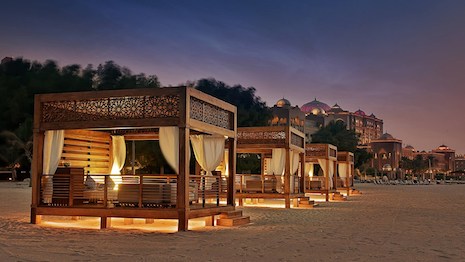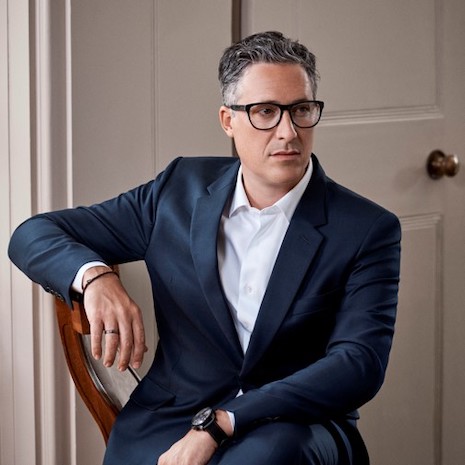 Shake things up. Image credit: Emirates Palace, Abu Dhabi
Shake things up. Image credit: Emirates Palace, Abu Dhabi
By Matteo Atti
This time last year, global lockdowns were in effect, and very little luxury travel was taking place.
Luxury travelers stayed put in one house or another, which contributed to a widespread decline in travel and hospitality. Three-quarters of businesses in the sector saw net revenue drop at least 60 percent, according to Barton Consulting as reported in VistaJet’s The Future of Private Travel.
Consumers stayed put due to government mandates and serious concerns around the health and safety of oneself, family and others. We were in this together.
Even if one could figure out a way to get up and go while adhering to safety, borders were closed, places to see and things to do were shuttered, and big events, such as Art Basel and the Tokyo Olympics, were cancelled or postponed.
Movers and shakers
Now, a year later, as luxury travel and hospitality begin to recover with the steady roll-out of vaccines in many global markets, customers have a new set of expectations and are facing the reality of a greatly changed travel experience and future. How has luxury consumer behavior been influenced by COVID-19? And how can luxury travel brands respond to this new set of expectations?
Based on a survey of nearly 100 leaders of luxury brands, one of the answers that emerged is that we must work together to offer clients a new level of service, access, privilege and experiences, often in safe, expanded-yet-closed environments. Collaboration will be the key to a successful recovery.
Fear around future pandemics and disruptions in the global ecosystem looms large. And consumers are preparing for it.
Countries are responding to this concern with dual citizenships, many of which are tied to home ownership.
Nearly a quarter of UHNWIs are planning to apply for a second passport or citizenship in 2021, according to the 2021 Knight Frank Wealth Report. This is a 50 percent growth compared to last year.
The pandemic has accelerated the movement toward globalism and collaboration between governments and the private sector. More and more the wealthy see themselves as global partners – citizens of the world.
As vaccines roll out and we become mobile again, luxury travelers have a jam of daunting country-by-country and even city-by-city new policies to navigate.
A last-minute change in a government COVID policy may necessitate a jet swap, an alternative chalet, new vacation household staffing, a revaluation of safety protocols or the resubmission of documents for custom clearance.
Allies will fly
A strong partnership network between flight, housing and staffing providers, along with open channels to government entities for information and problem-solving, can move quickly to address these needs.
The savvy luxury travel provider will understand all of this, including dual passports and citizenship, the exemptions that exist for business travel and house-hunting, as well as rules around pre-flight PCR testing and COVID-vaccine passports.
There are also restrictions on nationalities, points of departure and places recently visited that need sorting out. As lockdowns are lifted and borders opened, consumers will need up-to-date information.
“Partnerships are key to success,” said Lisa Selvin Aparicio, director of global sales at Rosewood Hotels and Resorts, adding we need to be with a partner “who has the same understanding of our clients that we do.
“Our guests should be confident that they should be able to relax and enjoy their time, because we don’t want to deprive them of that perfect experience,” she said.
Perhaps for this reason, three-quarters of luxury travel brands believe industry partnerships will increasingly benefit clients for future travel.
A full-service luxury vacation home company confirmed that partnerships will be “critically important,” representing a network of businesses “who can trust us with their clients and who we can trust with ours.”
Even if private jets are experiencing an unprecedented demand, we are unlikely to see a V-shaped rebound for ultra-luxury travel this year.
This insight gives us a clearer sense of the amount of help that consumers will need to travel again.
As industry players compete to win the loyalty of returning luxury travelers, strengthening one’s network of collaborations and partnerships to deliver an integrated, turnkey and seamless experience will help.
An added benefit of the collaborative business model is that it also provides more opportunities, benefits and perks to customers.
As we rebuild for a world shaped by the current pandemic, expect to see collaborations and partnerships play an increasingly significant role in the global ecosystem of luxury and private travel.
 Matteo Atti
Matteo Atti
Matteo Atti is London-based executive vice president of marketing and innovation at VistaJet and adjunct professor for luxury business at the International University of Monaco. Reach him at matteo.atti@vistajet.com.